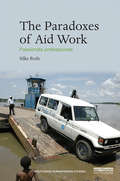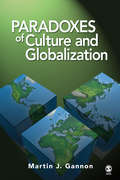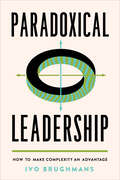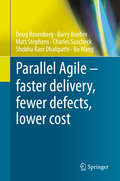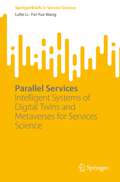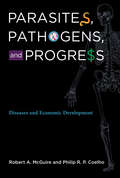- Table View
- List View
The Paradox of Vulnerability: States, Nationalism, and the Financial Crisis
by John L. Campbell John A. HallWhy are small and culturally homogeneous nation-states in the advanced capitalist world so prosperous? Examining how Denmark, Ireland, and Switzerland managed the 2008 financial crisis, The Paradox of Vulnerability shows that this is not an accident. John Campbell and John Hall argue that a prolonged sense of vulnerability within both the state and the nation encourages the development of institutions that enable decision makers to act together quickly in order to survive, especially during a crisis.Blending insights from studies of comparative political economy and nationalism and drawing on both extensive interviews and secondary data, Campbell and Hall support their claim by focusing on the three states historically and, more important, in their different responses to the 2008 crisis. The authors also devote attention to the difficulties faced by Greece and Iceland. The implications of their argument are profound. First, they show that there is a positive side to nationalism: social solidarity can enhance national prosperity. Second, because globalization now requires all states to become more adaptable, there are lessons here for other states, large and small. Lastly, the formula for prosperity presented here is under threat: highly homogeneous societies face challenges in dealing with immigration, with some responding in ways that threaten their success.The Paradox of Vulnerability demonstrates how the size and culture of a nation contribute in significant ways to its ability to handle political and economic pressures and challenges.
The Paradoxes of Aid Work: Passionate Professionals (Routledge Humanitarian Studies)
by Silke RothThis book explores what attracts people to aidwork and to what extent the promises of aidwork are fulfilled. 'Aidland' is a highly complex and heterogeneous context which includes many different occupations, forms of employment and organizations. Analysing the processes that lead to the involvement in development cooperation, emergency relief and human rights work and tracing the pathways into and through Aidland, the book addresses working and living conditions in Aidland, gender relations and inequality among aid personnel and what impact aidwork has on the life-courses of aidworkers. In order to capture the trajectories that lead to Aidland a biographical perspective is employed which reveals that boundary crossing between development cooperation, emergency relief and human rights is not unusual and that considering these fields as separate spheres might overlook important connections. Rich reflexive data is used to theorize about the often contradictory experiences of people working in aid whose careers are shaped by geo-politics, changing priorities of donors and a changing composition of the aid sector. Exploring the life worlds of people working in aid, this book contributes to the emerging sociology and anthropology of aidwork and will be of interest to professionals and researchers in humanitarian and development studies, sociology, anthropology, political science and international relations, international social work and social psychology.
Paradoxes of Culture and Globalization
by Martin J. Gannon"A truly extraordinary book! The range of knowledge revealed by the author is quite astonishing and the material presented is done so in a clear and unambiguous writing style."The book includes astonishingly varied perspectives on issues that will impact the hoped-for positive consequences of globalization. I felt I was being informed by an expert who grasps the complexity of the issues involved in ways that make them clear and useful. If I was teaching a course that had anything to do with globalization and/or culture, I would assign this book—and if I knew of someone who was being assigned to another country, I would require him or her to read this book."—Benjamin Schneider, Valtera Corporation and Professor Emeritus, University of MarylandWhat is a paradox? Why are cross-cultural paradoxes essential for understanding the changes that are occurring because of globalization? Encompassing a wide variety of areas including leadership, cross-cultural negotiations, immigration, religion, economic development, and business strategy, Paradoxes of Culture and Globalization develops cross-cultural paradoxes essential for understanding globalization. Key FeaturesHighlights over 90 paradoxes structured in a question/discussion format to actively engage readers and provide an integrative overview of the bookPresents key issues at a higher and integrative level of analysis to avoid stereotyping particular culturesFacilitates class discussions and the active involvement of class members in the learning process of culture and globalization.Enlarges individuals' conceptual understanding of cross-cultural issues Focuses on both traditional and controversial topics including motivation and leadership across cultures, communicating and negotiating across cultures, immigration, religion, geography, economic development, business strategy, and international human resource managementIntended AudienceThis is an excellent text for advanced undergraduate and graduate courses in International Management, International Business, Comparative Management, World Business Environment, Cross-Cultural Management, Cross-Cultural Communications, and Cultural Anthropology in the departments of business and management, communication, and anthropology.Meet author Martin J. Gannon! www.csusm.edu/mgannonMartin J. Gannon is also the author of the bestselling text Understanding Global Cultures (SAGE, Third Edition, 2004) and Cultural Metaphors: Readings, Research Translations, and Commentary (SAGE, 2000).
The Paradoxes of Globalisation
by Eric Milliot Nadine TournoisWorld economy globalization is driven by multiple interactive forces. Theygive rise to a number of paradoxes that impact the functional and developmental characteristics of firms. This book offers for the first time an in-depth study of the logical contradictions that stream from economic integration on the supranational level.
Paradoxes of Neoliberalism: Sex, Gender and Possibilities for Justice (Social Justice)
by Janet Jakobsen and Elizabeth BernsteinFrom the rise of far-right regimes to the tumult of the COVID-19 pandemic, recent years have brought global upheaval as well as the sedimentation of longstanding social inequalities. Analyzing the complexities of the current political moment in different geographic regions, this book addresses the paradoxical persistence of neoliberal policies and practices, in order to ground the pursuit of a more just world. Engaging theories of decoloniality, racial capitalism, queer materialism, and social reproduction, this book demonstrates the centrality of sexual politics to neoliberalism, including both social relations and statecraft. Drawing on ethnographic case studies, the authors show that gender and sexuality may be the site for policies like those pertaining to sex trafficking, which bundle together economics and changes to the structure of the state. In other instances, sexual politics are crucial components of policies on issues ranging from the growth of financial services to migration. Tracing the role of sexual politics across different localities and through different political domains, this book delineates the paradoxical assemblage that makes up contemporary neoliberal hegemony. In addition to exploring contemporary social relations of neoliberal governance, exploitation, domination, and exclusion, the authors also consider gender and sexuality as forces that have shaped myriad forms of community-based activism and resistance, including local efforts to pursue new forms of social change. By tracing neoliberal paradoxes across global sites, the book delineates the multiple dimensions of economic and cultural restructuring that have characterized neoliberal regimes and emergent activist responses to them. This innovative analysis of the relationship between gender justice and political economy will appeal to: interdisciplinary scholars in social and cultural studies; legal and political theorists; and the wide range of readers who are concerned with contemporary questions of social justice.
Paradoxes of Police Work (Second Edition)
by Douglas W. Perez<p>Through the eyes of a former police officer, <i>Paradoxes of Police Work</i>, 2nd edition leads the reader through the policies and inherent contradictions of law enforcement as described with real cop experiences and realities. In tell it like it is fashion, this book offers examples of real-life situations that occur constantly in the day-to-day operations of routine patrol and offers glimpses into the frustrations and stresses of law enforcement careers. <p><i>Paradoxes of Police Work</i>, 2nd edition tackles subjects that many academic texts and field books too often ignore. Controversial issues are often glossed over in other books, but their importance cannot be dismissed. Confronting them can lead to a better understanding of the profession, which can in turn create better professionals. Whether the book is used as a reader to support an academic course or in law enforcement training, the thought-provoking and insightful topic coverage clarifies the paradoxes in modern police work. <i>Paradoxes of Police Work</i>, 2nd edition is strongly suggested for introductory courses and academies, as well as for anyone considering a career in law enforcement. </p>
Paradoxes of Power and Leadership
by Miguel Pina Cunha Stewart R. Clegg Arménio Rego Marco BertiWhy do great companies and other organizations fail, sometimes abruptly? Why do admired leaders fall from their organizational pedestals? Why do young and promising managers derail? Why do organizations create and reinforce rules that manifestly damage both them and those that they employ, serve and sustain? Leadership is a much-discussed but ill-defined idea in business and management circles. Analysing and understanding the skills and behaviours exhibited in leadership practice reveal that leaders exhibit paradoxical activities that challenge our understanding of organizations. In this text, the authors identify leadership behaviours that compete towards business equilibrium: selfish versus selfless, distance versus proximity, consistency versus individuality, enforcing professional standards versus flexibility and control versus autonomy. These paradoxical dilemmas require a reflexive and analytical approach to a subject that is tricky to define. The book explores the paradoxes of power and leadership not as a panacea for solving organizational problems but as a lens through which leadership and power are seen as an exercise in dynamic balance. Read this book as an invitation to the paradoxes of power and leadership that frame organizational life today. Be prepared to find surprises – and some counterintuitive arguments. Providing a thought-provoking guide to the traits and skills that will help readers to understand and navigate paradoxical leadership behaviour, this reflexive book will be a useful reading for students and scholars of business, management and psychology globally.
Paradoxes of Professional Regulation: In Search of Regulatory Principles
by Michael J. TrebilcockOccupational licensure, including regulation of the professions, dates back to the medieval period. While the guilds that performed this regulatory function have long since vanished, professional regulation continues to this day. For instance, in the United States, 22 per cent of American workers must hold licenses simply to do their jobs. While long-established professions have more settled regulatory paradigms, the case studies in Paradoxes of Professional Regulation explore other professions, taking note of incompetent services and the serious risks they pose to the physical, mental, or emotional health, financial well-being, or legal status of uninformed consumers. Michael J. Trebilcock examines five case studies of the regulation of diverse professions, including alternative medicine, mental health care provision, financial planning, immigration consulting, and legal services. Noting the widely divergent approaches to the regulation of the same professions across different jurisdictions – paradoxes of professional regulation – the book is an attempt to develop a set of regulatory principles for the future. In its comparative approach, Paradoxes of Professional Regulation gets at the heart of the tensions influencing the regulatory landscape, and works toward practical lessons for bringing greater coherence to the way in which professions are regulated.
Paradoxical Leadership: How to Make Complexity an Advantage
by Ivo BrughmansOn a daily basis, leaders, managers, and professionals alike have to deal with tensions caused by differing and even opposite approaches. We often feel the need to make a fundamental choice between either one or the other for the sake of clarity. Using practical methodology and an extensive toolkit, Paradoxical Leadership reveals how to transform divisive dilemmas into creative solutions and paralyzing polarization into a constructive dialogue. Ivo Brughmans focuses on solutions that include both sides of the coin and reconcile conflicting views. He works out the fundamental principles of a paradoxical perspective and explains how to apply them to yourself as a person and a professional, how to integrate them into your leadership style, how to implement them in your team and organization, and how to conduct an effective dialogue on polarizing issues. Developing this paradoxical perspective, the book sheds a refreshingly new light on a wide range of fundamental organizational and management challenges, such as strategy development, business design, corporate governance, performance management, change, agility, innovation, diversity, culture transformation, leadership, and talent. Demonstrating how to manage contradictions, tensions, and dilemmas in a productive and inclusive way, Paradoxical Leadership provides the skills, frameworks, and tools necessary to integrate both/and thinking into your working and leadership style.
Paradoxien des Verbraucherverhaltens: Dokumentation der Jahreskonferenz 2017 des Netzwerks Verbraucherforschung
by Birgit Blättel-Mink Peter KenningDieses Buch informiert sie eingehend über die VerbraucherforschungDas Konsumentenverhalten ist für Unternehmen eine wichtige Kennzahl, um Marketingstrategien erfolgreich gestalten zu können. Nur wer seine Zielgruppe kennt, kann auf deren Bedürfnisse und Wünsche eingehen. Die wissenschaftliche Konferenz des Netzwerks Verbraucherforschung aus dem Jahr 2017 hatte zum Ziel, Paradoxien, Widersprüche und Ambivalenzen im Consumer Behaviour aufzudecken. Die Ergebnisse der Konferenz wurden in diesem Buch zur Verbraucherforschung festgehalten und analysiert.Neben der Thematisierung des verbraucherwissenschaftlichen Kontextes waren auch Sprecher aus der Politik an der Konferenz beteiligt. Aus diesem Grund werden auch die politischen Konsequenzen des Verhaltens von Verbrauchern in diesem Tagungsband diskutiert. Das Buch über die Verbraucherforschung berücksichtigt aktuelle Forschungsergebnisse. Gleichzeitig identifiziert es Forschungspotentiale für die Zukunft. Den Autoren ist es wichtig, nicht nur Wissenschaftlern einen Zugang zu diesem Wissen und den Erfahrungen zu liefern, sondern auch praxisbezogene Leser anzusprechen.Folgende Thematiken werden behandelt:Privatheit und Datenschutz beim Online-ShoppingParadoxien der Nutzung von IT-SystemenDas Spannungsverhältnis von Mode und nachhaltigem KonsumWidersprüche der Digitalisierung und des nachhaltigen KonsumsVerbraucherpolitische ImplikationenKonsequenzen für die Verbraucher- und KonsumforschungDie Podiumsdiskussionen der Konferenz von 2017 werden in diesem Buch zur Verbraucherforschung aus allen Sichten dargestellt, sodass der Leser ein differenziertes Bild aktueller Diskussionen erhält.
Paraguay: Recent Economic Developments
by International Monetary FundA report from the International Monetary Fund.
Paraguay: Selected Issues (Imf Staff Country Reports #No. 14/61)
by International Monetary Fund. Western Hemisphere Dept.A report from the International Monetary Fund.
Paraguay: Selected Issues (Imf Staff Country Reports #No. 14/61)
by International Monetary Fund. Western Hemisphere Dept.A report from the International Monetary Fund.
Paraguay: Corruption, Reform, and the Financial System
by Franks JeffreyThis publication examines the long-standing problems of corruption in Paraguay and its economic effects. It considers how these institutional problems have contributed to the country's long-term economic underperformance and options for addressing these problems drawing from international best practices. Issues discussed include: financial crises and private sector credit, reform of the Caja Fiscal, equilibrium real exchange rate, terms of trade and regional factors.
Paralegal Practice & Procedure (Fourth Edition)
by Deborah LarbalestrierThe completely revised and updated fourth edition of the most trusted paralegal desk references on the market. Now fully revised and expanded: the bestselling desk reference for paralegals at any level. Each chapter has been completely updated to include the latest step-by-step instructions for every aspect of a paralegal's job, with new procedures, checklists, and resources throughout. Topics covered include:* Paralegal ethics* Training programs* Court systems and court procedures* Federal court practice and procedures* Pretrial practice and procedure* Legal research tools* Electronic trial preparation proceduresIn addition to the general resources that will be of value to every paralegal, this guide also includes detailed information on practice and procedures for working in specialty law firms.
Parallel Agile – faster delivery, fewer defects, lower cost
by Doug Rosenberg Barry Boehm Matt Stephens Charles Suscheck Shobha Rani Dhalipathi Bo WangFrom the beginning of software time, people have wondered why it isn’t possible to accelerate software projects by simply adding staff. This is sometimes known as the “nine women can’t make a baby in one month” problem. The most famous treatise declaring this to be impossible is Fred Brooks’ 1975 book The Mythical Man-Month, in which he declares that “adding more programmers to a late software project makes it later,” and indeed this has proven largely true over the decades. Aided by a domain-driven code generator that quickly creates database and API code, Parallel Agile (PA) achieves significant schedule compression using parallelism: as many developers as necessary can independently and concurrently develop the scenarios from initial prototype through production code. Projects can scale by elastic staffing, rather than by stretching schedules for larger development efforts. Schedule compression with a large team of developers working in parallel is analogous to hardware acceleration of compute problems using parallel CPUs. PA has some similarities with and differences from other Agile approaches. Like most Agile methods, PA "gets to code early" and uses feedback from executable software to drive requirements and design. PA uses technical prototyping as a risk-mitigation strategy, to help sanity-check requirements for feasibility, and to evaluate different technical architectures and technologies. Unlike many Agile methods, PA does not support "design by refactoring," and it doesn't drive designs from unit tests. Instead, PA uses a minimalist UML-based design approach (Agile/ICONIX) that starts out with a domain model to facilitate communication across the development team, and partitions the system along use case boundaries, which enables parallel development. Parallel Agile is fully compatible with the Incremental Commitment Spiral Model (ICSM), which involves concurrent effort of a systems engineering team, a development team, and a test team working alongside the developers. The authors have been researching and refining the PA process for several years on multiple test projects that have involved over 200 developers. The book’s example project details the design of one of these test projects, a crowdsourced traffic safety system.
Parallel Programming for Modern High Performance Computing Systems
by Pawel CzarnulIn view of the growing presence and popularity of multicore and manycore processors, accelerators, and coprocessors, as well as clusters using such computing devices, the development of efficient parallel applications has become a key challenge to be able to exploit the performance of such systems. This book covers the scope of parallel programming for modern high performance computing systems. It first discusses selected and popular state-of-the-art computing devices and systems available today, These include multicore CPUs, manycore (co)processors, such as Intel Xeon Phi, accelerators, such as GPUs, and clusters, as well as programming models supported on these platforms. It next introduces parallelization through important programming paradigms, such as master-slave, geometric Single Program Multiple Data (SPMD) and divide-and-conquer. The practical and useful elements of the most popular and important APIs for programming parallel HPC systems are discussed, including MPI, OpenMP, Pthreads, CUDA, OpenCL, and OpenACC. It also demonstrates, through selected code listings, how selected APIs can be used to implement important programming paradigms. Furthermore, it shows how the codes can be compiled and executed in a Linux environment. The book also presents hybrid codes that integrate selected APIs for potentially multi-level parallelization and utilization of heterogeneous resources, and it shows how to use modern elements of these APIs. Selected optimization techniques are also included, such as overlapping communication and computations implemented using various APIs. Features: Discusses the popular and currently available computing devices and cluster systems Includes typical paradigms used in parallel programs Explores popular APIs for programming parallel applications Provides code templates that can be used for implementation of paradigms Provides hybrid code examples allowing multi-level parallelization Covers the optimization of parallel programs
Parallel Services: Intelligent Systems of Digital Twins and Metaverses for Services Science (SpringerBriefs in Service Science)
by Lefei Li Fei-Yue WangBy incorporating the latest advancement in complex system modeling and simulation into the service system research, this book makes a valuable contribution to this field that will lead service innovation and service management toward the digital twin and metaverse. It covers important topics such as computational experiments and parallel execution of a parallel service system, the modeling of artificial service systems, semi-parallel service systems, parallel service, and digital twin/metaverse. It also provides a unified framework for realizing a parallel service system that demonstrates the capabilities or potentials of adopting digital twin and metaverse. In addition, the book contains numerous solutions to real-world problems, through which both academic readers and practitioners will gain new perspectives on service systems, and learn how to model a parallel service system or how to use the model to analyze and understand the behaviors of the system. For academic readers, it sheds light on a new research direction within the service science/engineering domain made possible by the latest technologies. For practitioners, with the help of methods such as Agent-based Modeling and Simulation, the book will enable them to enhance their skills in designing or analyzing a service system.
Paramount Equipment
by Wei Wang Carliss Y. BaldwinParamount Equipment, Inc., based in Fort Wayne, Indiana, is a large manufacturer of cranes and compact construction equipment, aerial work platforms, and food service equipment. Founded in 1987, Paramount now had manufacturing operations in 24 countries. However, it lost its competitive position because it took on too much debt in the form of bank borrowings relative to the risk level of its business. Now the company must seek funding and guarantees in order to restructure its debt. Paramount's future depends on whether existing lenders, management, and the government of Ontario-where the company employs more than 7,000-can reach a feasible restructuring and refinancing plan fast and whether Paramount was able to secure a capital injection from new investors. Students must determine the optimal capital structure policy consistent with competitive risks and assess available tools for financing a company in financial distress. The case requires students to perform only limited quantitative analysis and is ideal for use in first-year MBA courses in financial strategy or corporate finance. It would also work well in advanced undergraduate finance courses that cover capital structure and financial distress.
Los paranoicos se salvan: Consejos para afrontar la crisis que trajo la pandemia
by Mario BorghinoConsejos esenciales para superar la crisis económica causada por el coronavirus. A lo largo de su carrera profesional, Mario Borghino ha enseñado a los ejecutivos y emprendedores a enfrentar los cambios y a tomar decisiones con cierto nivel de incertidumbre, teniendo en cuenta que un plan B siempre es necesario por si falla el original. Pero esta vez, tras la aparición del virus conocido como SARS-CoV-2, la incertidumbre se ha vuelto extraordinaria y el nivel de volatilidad es tal que es necesario repensar por completo los modelos estratégicos tradicionales y revisar cuáles ideas nos pueden ayudar a controlar lo incontrolable. Ante esta o "nueva normalidad", las dificultades potenciales son tan evidentes que será necesario integrar en tu negocio, en tu trabajo o en tu vida personal, una actitud preventiva, casi paranoica, como el camino más aconsejable. Podrás decir que un paranoico es una persona con untrastorno mental o un trastorno de personalidad, pero no siempre es así. El nuevo lema es "piensa mal y te irá bien". Es hora de instalarte mentalmente en un sitio que te ponga en estado de alerta ante amenazas y dificultades inéditas. Visualizar la situación presente con esta actitud te permitirá ganar tiempo y usar de la mejor manera tu inteligencia lógica y cuantitativa. Se trata de anticiparse como un mecanismo de defensa. Una actitud preventiva también es una actitud proactiva de solución de problemas. Descubre aquí cómo convertir esta actitud en un método de éxito para los negocios, que te permita además identificar cuáles son los mercados que tendrán más probabilidades de salir adelante en medio de la crisis que ha dejado la pandemia.
Los paranoicos se salvan (Versión extendida): Consejos para afrontar la crisis que trajo la pandemia
by Mario BorghinoDESCUBRE LOS MEJORES NEGOCIOS DIGITALES PARA NUEVOS EMPRENDEDORES EN UN MUNDO DE ALTA INCERTIDUMBRE. Tras la aparición del SARS-CoV-2, la incertidumbre se ha vuelto tan extraordinaria y el nivel de volatilidad es tal que es indispensable repensar por completo los modelos estratégicos tradicionales y aquellas ideas que nos pueden ayudar a controlar lo incontrolable. Ante esta "nueva normalidad", las dificultades potenciales son tan evidentes que resulta necesario integrar en tu negocio, en tu trabajo o en tu vida personal una actitud preventiva, casi paranoica. El nuevo lema es "piensa mal y te irá bien". Es hora de instalarte en un estado de alerta ante amenazas inéditas. Visualizar el presente con esta actitud te permitirá ganar tiempo y usar de la mejor manera tu inteligencia empresarial. Se trata de anticiparse como un mecanismo de defensa. Una actitud preventiva también es una actitud proactiva desolución de problemas. Descubre junto a Mario Borghino cómo convertir esta actitud en un método de éxito para los negocios y superar la crisis que ha dejado la pandemia. INCLUYE CONSEJOS PARA ADAPTARSE A LAS TENDENCIAS ACTUALES: DESDE EL HOME OFFICE HASTA LA VENTA EN LÍNEA.
Paranoid Finance (Theory Redux)
by Fabian MuniesaThere is a link between finance and paranoia, and that link may well be inescapable. At the core of financial imagination lies a notion of value – of ‘value creation’ – that is loaded with trouble. This is the trouble of a fragile metaphor: a metaphor of fecund money and future return, of true value and false value, of true value that should be protected from the perils of dilapidation, expropriation and speculation, but whose substance is in fact nowhere to be found. Contemporary conspiratorial, millennialist discourse on money, banking and wealth does not embody a delirious misrepresentation of the logic of finance: rather, it exacerbates the paranoid potentials inherent in mainstream financial imagination. This is the radical hypothesis developed in this book: that of paranoid finance as a sedimentation of the demons that haunt the conventional categories of financial value. Tutorials abound today that guarantee access to secret knowledge about the financial system, to magical currencies that release eternal returns, to legal schemes conducive to personal sovereignty, and to a way out of economic enslavement. They often combine disparate elements of esotericism, conspiratorialism, antisemitism, populism, libertarianism or spiritualism. But as Muniesa shows, they also provide a testbed for a critique of the limits of financial imagination.
Parasites, Pathogens, and Progress: Diseases and Economic Development
by Robert A. McGuire Philip R. CoelhoThe crucial role played by diseases in economic progress, the growth of civilizations, and American history.In Parasites, Pathogens, and Progress, Robert McGuire and Philip Coelho integrate biological and economic perspectives into an explanation of the historical development of humanity and the economy, paying particular attention to the American experience, its history and development. In their path-breaking examination of the impact of population growth and parasitic diseases, they contend that interpretations of history that minimize or ignore the physical environment are incomplete or wrong.The authors emphasize the paradoxical impact of population growth and density on progress. An increased population leads to increased market size, specialization, productivity, and living standards. Simultaneously, increased population density can provide an ecological niche for pathogens and parasites that prey upon humanity, increasing morbidity and mortality. The tension between diseases and progress continues, with progress dominant since the late 1800s.Integral to their story are the differential effects of diseases on different ethnic (racial) groups. McGuire and Coelho show that the Europeanization of the Americas, for example, was caused by Old World diseases unwittingly brought to the New World, not by superior technology and weaponry. The decimation of Native Americans by pathogens vastly exceeded that caused by war and human predation.The authors combine biological and economic analyses to explain the concentration of African slaves in the American South. African labor was more profitable in the South because Africans' evolutionary heritage enabled them to resist the diseases that became established there; conversely, Africans' ancestral heritage made them susceptible to northern “cold-weather” diseases. European disease resistance and susceptibilities were the opposite regionally. Differential regional disease ecologies thus led to a heritage of racial slavery and racism.
Parasites, Pathogens, and Progress: Diseases and Economic Development
by Robert A. Mcguire Philip R. P. CoelhoIn Parasites, Pathogens, and Progress, Robert McGuire and Philip Coelho integrate biological and economic perspectives into an explanation of the historical development of humanity and the economy, paying particular attention to the American experience, its history and development. In their path-breaking examination of the impact of population growth and parasitic diseases, they contend that interpretations of history that minimize or ignore the physical environment are incomplete or wrong. The authors emphasize the paradoxical impact of population growth and density on progress. An increased population leads to increased market size, specialization, productivity, and living standards. Simultaneously, it can provide an ecological niche for pathogens and parasites that prey upon humanity, increasing morbidity and mortality. The tension between diseases and progress continues, with progress dominant since the late 1800s. Integral to their story are the differential effects of diseases on different ethnic (racial) groups. McGuire and Coelho show that the Europeanization of the Americas, for example, was caused by Old World diseases unwittingly brought to the New World, not by superior technology and weaponry. The decimation of Native Americans by pathogens vastly exceeded that caused by war and human predation. The authors combine biological and economic analyses to explain the concentration of African slaves in the American South. African labor was more profitable in the South because Africans' evolutionary heritage enabled them to resist the diseases that became established there; conversely, Africans' ancestral heritage made them susceptible to northern "cold-weather" diseases. European disease resistance and susceptibilities were the opposite regionally. Differential regional disease ecologies thus led to a heritage of racial slavery and racism.
Parcerias do mestre Limitadas: Parcerias do mestre Limitadas são uma ótima maneira de investir em energia.
by Richard StookerMaster Limited Partnerships são uma ótima maneira de investir em energia. Em um mundo de baixo rendimento, onde os títulos do governo quase não pagam juros, as ações S&P 500 pagam pouco mais do que em dividendos, o governo canadense está prestes a tributar fundos de renda e até mesmo fundos de investimento imobiliário estão sofrendo problemas de fluxo de caixa, um tipo de segurança ainda permanece como um farol de esperança para os investidores de renda.

